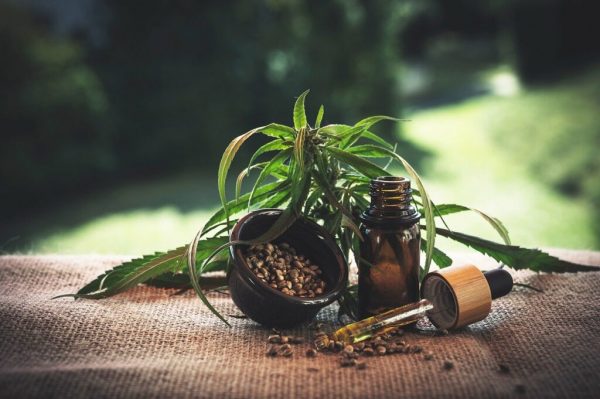Studies suggest that CBD, also known as cannabidiol, can help ease symptoms of anxiety and pain. While CBD oil doesn’t cause drowsiness — like is the case for many sleep aids such as melatonin or Benadryl — it might help you fall asleep if you experience regular symptoms of anxiety and pain.

How CBD interacts with the body
Cannabidiol (CBD) is one of the dozens of cannabinoid compounds found in the cannabis plant. CBD oil can be made from both marijuana or hemp cannabis plant, and can be extracted in a number of ways. However, in order for CBD products to be considered legal, they must come from a hemp plant and have low (0.03%) or no THC levels. For this reason, CBD doesn’t produce a ‘high’, but research nevertheless shows that it can have some positive effects on the body.
CBD’s effects all come down to the body’s endocannabinoid system, which is a network of 5-HT receptors that are activated and play a role in maintaining homeostasis in the body. Homeostasis affects pain, mood, and appetite among others other factors. While the body already has its own set of cannabinoids, introducing CBD to the body enhances the efficacy of the endocannabinoid system.
Until not long ago, scientists used to think that CBD oil acts on CB1 and CB2 receptors, but new research showed that’s not the case. Instead, the cannabinoid affects the mechanism that binds specific receptors involved in anxiety (serotonin 5-HT1A) and pain (vanilloid TRPV1).
Although more robust clinical data is needed, there is evidence that suggests CBD can relieve pain and anxiety, without the potentially dangerous side effects of the THC.
For this reason, those who have such symptoms — which are known to interfere with sleep patterns — might sleep better after using CBD oil.
A survey by Consumer Research suggests that 10% of Americans who tried CBD reported sleeping better. However, this is rather anecdotal evidence.
In 2019, researchers studied the clinical application of CBD of anxiety and sleep complaints in 103 adult patients at a psychiatric clinic. The researchers found that 80% of the patients had decreased anxiety scores and 66% of patients improved their sleep.
“The results of our clinical report support the existing scientific evidence. In our study, we saw no evidence of a safety issue that would limit future studies. In this evaluation, CBD appears to be better tolerated than routine psychiatric medications. Furthermore, CBD displays promise as a tool for reducing anxiety in clinical populations, but given the open-label and nonrandomized nature of this large case series, all results must be interpreted very cautiously. Randomized and controlled trials are needed to provide definitive clinical guidance, the authors of the study wrote in The Permanente Journal.
In 2017, researchers at the National Center for PTSD-Dissemination & Training Division in Palo Alto, California investigated the association between cannabis and sleep, finding that “cannabidiol (CBD) may have therapeutic potential for the treatment of insomnia,” while “THC may decrease sleep latency but could impair sleep quality long-term.”
Specifically, this study found that CBD could be especially helpful for people with REM sleep behavior disorder, characterized by moving, talking, or sleepwalking while fully asleep.
Sleep apnea affects one in five American adults, and the same study also suggests that CBD might help. Sleep apnea, characterized by breathing repeatedly stopping and starting, is considered a REM sleep behavior disorder.
These studies suggest that CBD might work as a sleep aid for people who are struggling with sleep-related problems. However, CBD oil shouldn’t make you sleepy as over-counter sleep aids do. This means that people ought to be able to take CBD during the daytime and not feel drowsy. However, the studies are few and far between and are limited in the scope. The link between CBD and improved sleep remains far from settled, however, studies so far suggest no safety issues.
The being said, the FDA says that they have “only limited data about CBD safety and these data point to real risks that need to be considered before taking CBD for any reason.” They also state on their website that CBD can cause liver injury, affect the metabolism of other drugs, and that the use of CBD with alcohol or other depressants increases the risk of sedation and drowsiness.